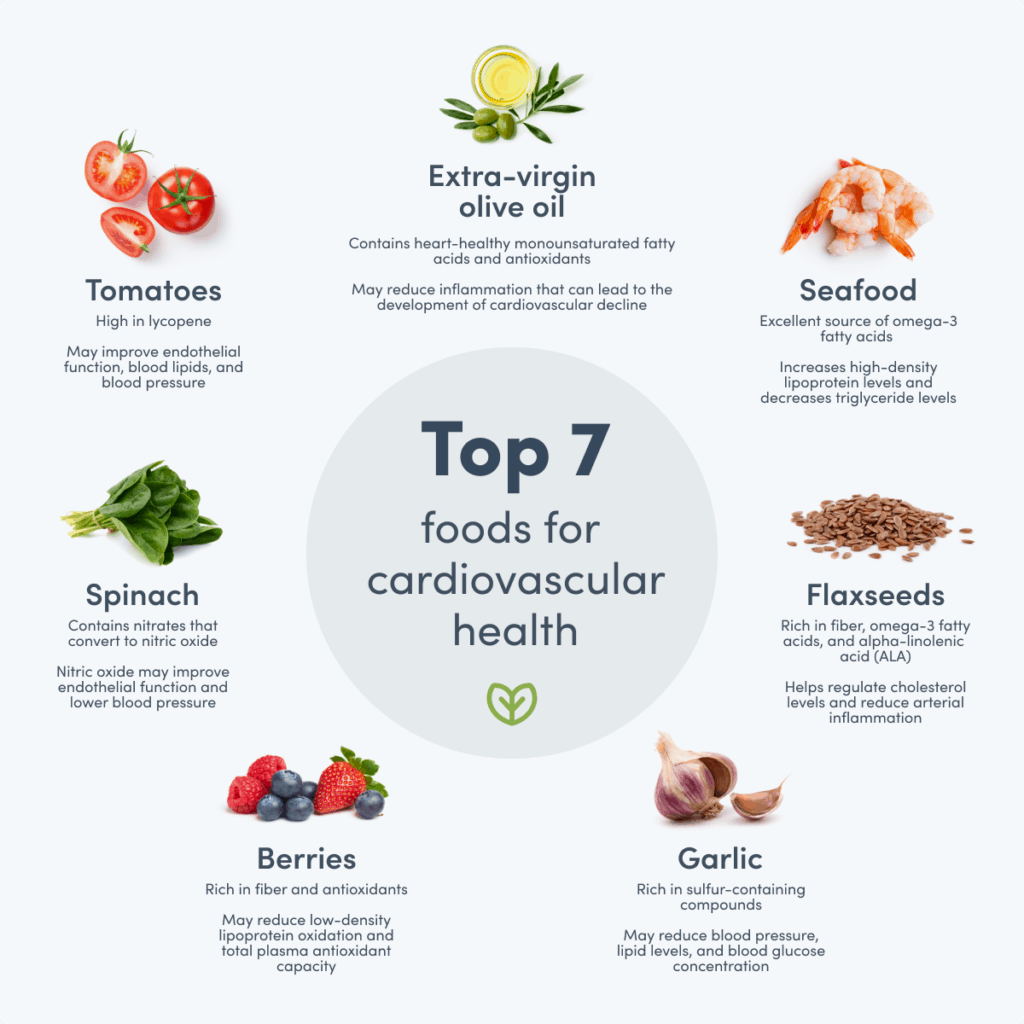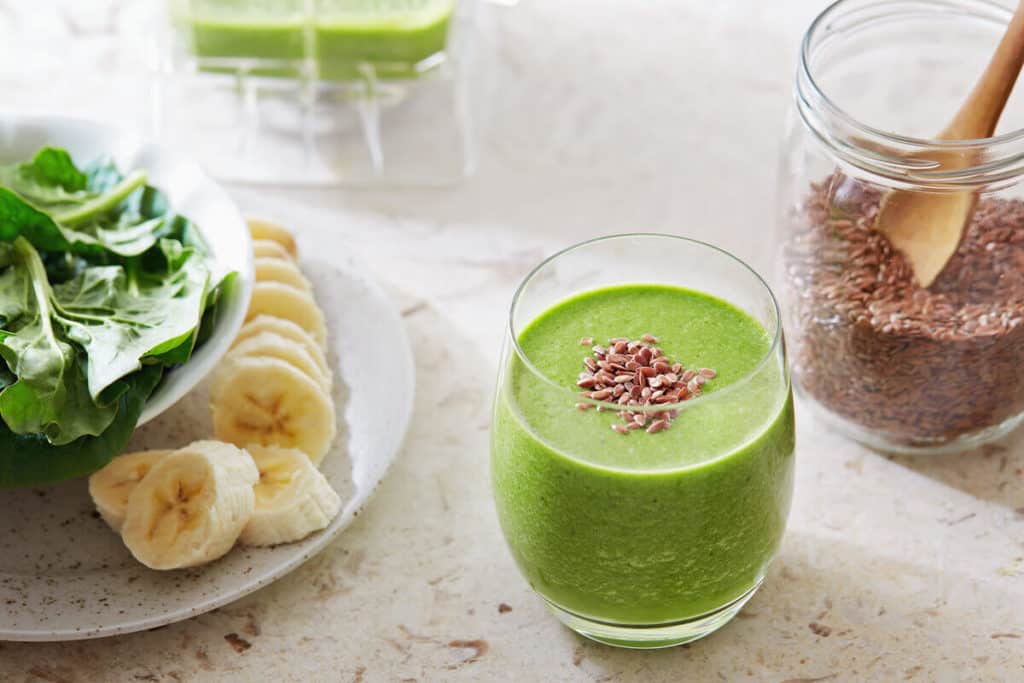
Top 7 foods for cardio health
Taking good care of your cardiovascular system can be as easy as picking the right foods at the grocery store or local market. Consider regularly incorporating the following seven evidence-based, heart-protective foods into your cooking and eating routines.1. Garlic
Loved and used liberally by many cultures throughout the world, adding garlic to your diet is a simple way to help keep heart disease at bay. Several clinical trials and studies have been conducted on garlic and its sulphur-containing compounds. (14)(20)
2. Seafood
Anti-inflammatory omega-3 fatty acids, abundant in seafood such as salmon, sardines, and mackerel, have consistently been shown to positively affect heart health. Specifically, eicosapentaenoic acid (EPA) and docosahexaenoic acid (DHA) are the polyunsaturated long-chain fatty acids found in seafood that help reduce inflammation and lower elevated triglyceride levels. (17) Interestingly, DHA in particular, has been shown to increase high-density lipoprotein (HDL) levels and decrease triglyceride levels, two factors that contribute to cardiovascular health. (11) The American Heart Institute recommends we consume at least two servings of omega 3-rich foods per week. (1) From poached salmon to grilled arctic char, the opportunities are endless when adding one of the best foods for heart health to your plate.3. Flaxseeds
These small but mighty seeds pack a punch when it comes to improving cardiovascular health. Consumed by humans since ancient times, flaxseeds have been used by cultures around the world for dietary and medicinal purposes. The soluble gum in these fiber-rich seeds may play a role in regulating cholesterol levels. (13)
4. EVOO
Extra-virgin olive oil, commonly known as EVOO, is one of the cornerstones of the Mediterranean diet, a heart-healthy eating program. Clinical research has shown that its cardioprotective qualities may be a result of the bioactive compounds and carotenoids, such as beta carotene, found in olive oil. These potent antioxidants help to reduce inflammation that can lead to the development of cardiovascular decline. (9) The abundance of monounsaturated fatty acids combined with tocopherols and polyphenols seem to be the perfect combination for keeping blood vessels and arteries happy and healthy. Monounsaturated fatty acids help to reduce triglyceride levels while anti-inflammatory antioxidants can reduce the burden on arteries by providing them with the nutrients they need to function optimally. (16) Drizzling this heart-healthy oil on to your favorite meals might just nourish your body as much as your taste buds.5. Berries
Is there anything better than fresh, local berries in the summer months? From blackberries to strawberries, these little gems, loaded with polyphenols, nutrients, and fiber, help reduce the risk of cardiovascular complications. Regular berry consumption has been shown to reduce LDL oxidation and total plasma antioxidant capacity, both factors involved in reducing the risk of cardiovascular disease. (2)
6. Spinach
It comes as no surprise that nutrient-dense spinach has made it onto the foods for a healthy heart list. The nitrates found in spinach, when converted to nitric oxide in the body, have been shown to improve endothelial function and lower blood pressure, both key factors in maintaining cardiovascular health. (3) Studies have shown that the consumption of nitrate-rich vegetables such as spinach reduces blood pressure while increasing plasma nitrate concentrations. (12) From salads to soups and everything in between, throwing a handful into your meals is easy. Now we have yet another reason to eat our greens.7. Tomatoes
Tomatoes have also been recognized as a cardiovascular supportive food. Research has demonstrated their ability to improve markers of cardiovascular disease, such as endothelial function, blood lipids, and blood pressure. (5) High concentrations of lycopene, an essential nutrient found in tomatoes, may reduce the risk of stroke up to 26%. (4) Interestingly enough, cooking tomatoes may actually make their protective compounds more bioavailable during digestion compared to their raw counterparts. (6) Italians may be onto something with their stewed tomato sauces that are undoubtedly also packed with heart-healthy garlic.The bottom line
Every meal gives us the opportunity to nourish our bodies and support our cardiovascular systems. Adding in heart-healthy pantry staples like garlic, EVOO, and flaxseeds are simple ways to elevate everyday meals. Regularly consuming fresh seafood, berries, spinach, and tomatoes not only provide the building blocks for everyday health, but all contribute to optimal cardiovascular health. With so many heart-healthy foods to choose from, it’s easier than ever to fill our bodies with nutrients that prevent and protect our bodies against cardiovascular conditions – in other words, the power is on our plates.- American Heart Association. (2020). Fish and omega-3 fatty acids. Retrieved from https://www.heart.org/en/healthy-living/healthy-eating/eat-smart/fats/fish-and-omega-3-fatty-acids
- Basu, A., Rhone, M., & Lyons, T. J. (2010). Berries: emerging impact on cardiovascular health. Nutrition Reviews, 68(3), 168–177. https://doi.org/10.1111/j.1753-4887.2010.00273.x
- Bondonno, C. P., Yang, X., Croft, K. D., Considine, M. J., Ward, N. C., Rich, L., Puddey, I. B., Swinny, E., Mubarak, A., & Hodgson, J. M. (2012). Flavonoid-rich apples and nitrate-rich spinach augment nitric oxide status and improve endothelial function in healthy men and women: a randomized controlled trial. Free Radical Biology and Medicine, 52(1), 95–102. https://doi.org/10.1016/j.freeradbiomed.2011.09.028
- Cheng, Ho M., Koutsidis, G., Lodge, J. K., Ashor, A. W., Siervo, M., & Lara, J. (2017). Lycopene and tomato and risk of cardiovascular diseases: A systematic review and meta-analysis of epidemiological evidence. Critical Reviews in Food Science and Nutrition, 59(1), 141–158. https://doi.org/10.1080/10408398.2017.1362630
- Cheng, Ho Ming, Koutsidis, G., Lodge, J. K., Ashor, A., Siervo, M., & Lara, J. (2017). Tomato and lycopene supplementation and cardiovascular risk factors: A systematic review and meta-analysis. Atherosclerosis, 257, 100–108. https://doi.org/10.1016/j.atherosclerosis.2017.01.009
- de Alvarenga, J. F. R., Lozano-Castellón, J., Martínez-Huélamo, M., Vallverdú-Queralt, A., & Lamuela-Raventós, R. M. (2018). Cooking Practice and the Matrix Effect on the Health Properties of Mediterranean Diet: A Study in Tomato Sauce. ACS Symposium Series, 305–314. https://doi.org/10.1021/bk-2018-1286.ch016
- DiNicolantonio, J. J., Lucan, S. C., & O’Keefe, J. H. (2016). The Evidence for Saturated Fat and for Sugar Related to Coronary Heart Disease. Progress in Cardiovascular Diseases, 58(5), 464–472. https://doi.org/10.1016/j.pcad.2015.11.006
- Erdmann, K., Cheung, B. W. Y., & Schröder, H. (2008). The possible roles of food-derived bioactive peptides in reducing the risk of cardiovascular disease. The Journal of Nutritional Biochemistry, 19(10), 643–654. https://doi.org/10.1016/j.jnutbio.2007.11.010
- Gavahian, M., Mousavi Khaneghah, A., Lorenzo, J. M., Munekata, P. E. S., Garcia-Mantrana, I., Collado, M. C., Meléndez-Martínez, A. J., & Barba, F. J. (2019). Health benefits of olive oil and its components: Impacts on gut microbiota antioxidant activities, and prevention of noncommunicable diseases. Trends in Food Science & Technology, 88, 220–227. https://doi.org/10.1016/j.tifs.2019.03.008
- Heart Disease Facts | cdc.gov. (2019, December 2). Centers for Disease Control and Prevention. https://www.cdc.gov/heart-disease/data-research/facts-stats/index.html
- Innes, J., & Calder, P. (2018). The Differential Effects of Eicosapentaenoic Acid and Docosahexaenoic Acid on Cardiometabolic Risk Factors: A Systematic Review. International Journal of Molecular Sciences, 19(2), 532. https://doi.org/10.3390/ijms19020532
- Jonvik, K. L., Nyakayiru, J., Pinckaers, P. J., Senden, J. M., van Loon, L. J., & Verdijk, L. B. (2016). Nitrate-Rich Vegetables Increase Plasma Nitrate and Nitrite Concentrations and Lower Blood Pressure in Healthy Adults. The Journal of Nutrition, 146(5), 986–993. https://doi.org/10.3945/jn.116.229807
- Kajla, P., Sharma, A., & Sood, D. R. (2014). Flaxseed—a potential functional food source. Journal of Food Science and Technology, 52(4), 1857–1871. https://doi.org/10.1007/s13197-014-1293-y
- Lau, B. H. S. (2006). Suppression of LDL Oxidation by Garlic Compounds Is a Possible Mechanism of Cardiovascular Health Benefit. The Journal of Nutrition, 136(3), 765S-768S. https://doi.org/10.1093/jn/136.3.765s
- Majewski, M., Kucharczyk, E., Kaliszan, R., Markuszewski, M., Fotschki, B., Juśkiewicz, J., Borkowska-Sztachańska, M., & Ognik, K. (2020). The Characterization of Ground Raspberry Seeds and the Physiological Response to Supplementation in Hypertensive and Normotensive Rats. Nutrients, 12(6), 1630. https://doi.org/10.3390/nu12061630
- Nocella, C., Cammisotto, V., Fianchini, L., D’Amico, A., Novo, M., Castellani, V., Stefanini, L., Violi, F., & Carnevale, R. (2017). Extra Virgin Olive Oil and Cardiovascular Diseases: Benefits for Human Health. Endocrine, Metabolic & Immune Disorders – Drug Targets, 18(1), 10. https://doi.org/10.2174/1871530317666171114121533
- Oscarsson J, Hurt-Camejo E. Omega-3 fatty acids eicosapentaenoic acid and docosahexaenoic acid and their mechanisms of action on apolipoprotein B-containing lipoproteins in humans: a review. Lipids Health Dis. 2017;16(1):149. Published 2017 Aug 10. doi:10.1186/s12944-017-0541-3
- Parikh, M., Netticadan, T., & Pierce, G. N. (2018). Flaxseed: its bioactive components and their cardiovascular benefits. American Journal of Physiology-Heart and Circulatory Physiology, 314(2), H146–H159. https://doi.org/10.1152/ajpheart.00400.2017
- Public Health Agency of Canada. (2017). Heart Disease in Canada – Canada.ca. Government of Canada. https://www.canada.ca/en/public-health/services/publications/diseases-conditions/heart-disease-canada.html
- Tsai, C.-W., Chen, H.-W., Sheen, L.-Y., & Lii, C.-K. (2012). Garlic: Health benefits and actions. BioMedicine, 2(1), 17–29. https://doi.org/10.1016/j.biomed.2011.12.002
- Wood, E., Hein, S., Heiss, C., Williams, C., & Rodriguez-Mateos, A. (2019). Blueberries and cardiovascular disease prevention. Food & Function, 10(12), 7621–7633. https://doi.org/10.1039/c9fo02291k





